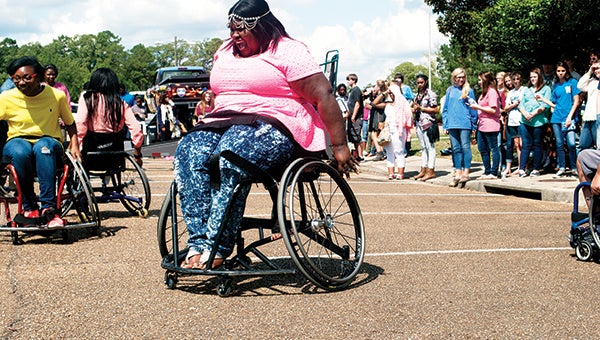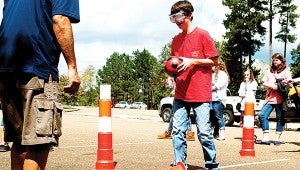NCAAD promotes better lives
Published 10:42 am Thursday, October 1, 2015

Photos by Julia V. Pendley
Above, Shania Dixon of Brookhaven High School practices rolling around in one of M.A.C.E. athletic wheelchairs.
“Just remember, it could be worse,” M.A.C.E. CEO Antonio Wright told students Wednesday at the annual TTYL conference.
The Total Truth Youth Leadership conference, sponsored by the National Council of Alcohol and Drug Dependence, helps direct high school students down the right path by adding some perspective to challenges students face. The conference was held at the Thames Center on Copiah-Lincoln Community College and featured topics on drugs, tobacco, driving safety and handicapped sports.
Although the M.A.C.E. session focused on handicapped sports, Wright said the goal is to point out that life isn’t fair, but each person can make the best of it.
Wright played football at Jackson State University but was in a car accident that left him paralyzed. Being in that position, he learned there were not many activities for handicapped people. Instead of complaining about it, he decided to fix it.
Wright called Wesson resident Robbie Sullivan, who was paralyzed following a fall from a deer stand. M.A.C.E. began to take shape. Now, they coordinate sports such as wheelchair basketball, softball and tennis. They recently hosted the 2015 Wheelchair Softball World Series in Biloxi, and they plan on welcoming everyone back in 2016.
“It [wheelchair sports] gives them the chance to play something they never thought they would get to again,” Sullivan said. “It can happen to anyone.”
M.A.C.E. didn’t tell the students; they showed them. Each student was strapped into an athletic wheelchair and they played a little wheelchair basketball.
“They say they can play real basketball on their feet — that’s easy,” Carlos Blackman said.
Sullivan said the difficulty is that in a wheelchair you’re 2.5 to 3 feet lower, and you can’t use your legs. He said most people can make a free throw when standing, but they have to get a lot closer in a wheelchair.
“We all focus on our own problems,” Wright said. “I want them to have a changed perspective (…) The reality is I’m blessed; I’m paralyzed, but it could be worse.”
Suicide prevention
Phi Theta Kappa Vice President of Service Katelyn Roberts presented the keynote address about suicide prevention. PTK’s service project this year is “Keep living” because they felt it was important to address something that affects so many people, especially college students.
Suicide is the second leading cause of death for college students and is the 10th overall in the U.S. Roberts drew on her own experience in losing her mother in 2009 when she was just 13 years old.
“[I] was overcome with grief, anguish and pain day and night,” she said.
She recalled blaming herself and getting angry at her mom. She longed to tell her of her accomplishments or just day-to-day news. Sometimes she just wishes her mother could hold her and comfort her.
“A person who commits suicide is a brother who will never see his sister graduate, and a mother who won’t help her daughter plan her wedding,” Roberts said. “They take a part of someone else.”
She reminded those struggling with depression that people care, and they are willing to help.
Drug consequences
John Douglas of the District 14 Drug Court spoke to students about the negative impact drugs have on users’ lives. Instead of citing statistics though, he brought someone dealing with the consequences first-hand.
“He’s been through a lot, and he’s still in the middle of it,” Douglas said.
The 23-year-old man is in the process of cleaning up his life after being released from prison last week. His descent began at age 11 when he first began to drink. Soon he moved onto marijuana, then spice (synthetic marijuana) and bath salts (synthetic crystal methamphetamine or cocaine). And though drugs prompted it, he actually got arrested for grand larceny — things he was stealing to sell for drug money.
Now, he is involved in the drug court system, which allows non-violent drug offenders to get help through the court system. In return, their charges are non-adjudicated and essentially wiped from their records.
“Hopefully we’ve helped the person with addiction and stopped the cycle,” Douglas said.
MDOT
The Mississippi Department of Transportation presented information about seatbelt safety and drunk driving. MDOT had a rollover simulator and demonstrated what happens when an adult, a 2-year-old and a 6-year old are in a roll-over accident at 45 miles per hour. They also had drunken goggles (at two times and three times the legal limit) for the students to wear while performing tasks.
“Hopefully we reach somebody that is indecisive about what the purpose of a seatbelt is,” Amy Humphrey of MDOT said.
Dangers of Tobacco
Emily Austin of the American Lung Association said they have included the dangers of e-cigarettes in their talks in addition to the standard tobacco dangers. Their presentation included a video game to help demonstrate.
Austin said conferences like this allowed for smaller groups, which helps educate the students more.
“They’re less intimidated and ask more questions and therefore get more information,” she said.






